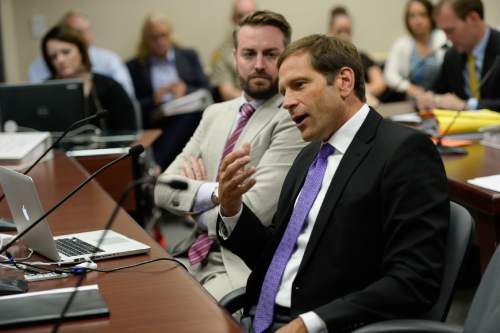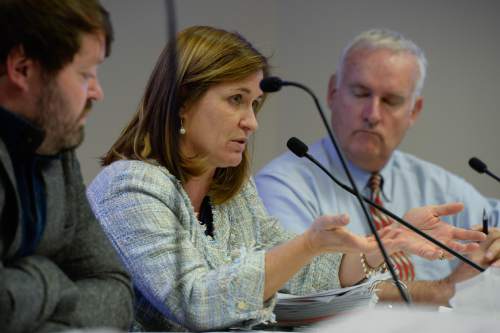This is an archived article that was published on sltrib.com in 2015, and information in the article may be outdated. It is provided only for personal research purposes and may not be reprinted.
Salt Lake City resident Steve Summers wanted to know Tuesday how the County Council could keep underwriting the Utah Association of Counties (UAC) after its attempted coronation of Phil Lyman.
"Are we getting the value of our membership?" asked Summers, referring to the county's $320,000 annual contribution to UAC, which earlier this month named Lyman its County Commissioner of the Year despite — or largely because of — his misdemeanor conviction in a public-lands dispute in San Juan County, where Lyman lives.
Summers had solid support Tuesday from County Council Democrats who shared his outrage over the honor, which the San Juan County commissioner declined due to the hubbub that followed the decision by a UAC subcommittee of county commissioners.
"It was embarrassing. It was frankly alarming that the majority of our county colleagues would hold up this individual as the example of what we should be as county officials," said Councilman Arlyn Bradshaw. "To me, it's such a black eye."
Added Councilman Jim Bradley: "I get embarrassed when I have to represent a county that's part of UAC" when it supports positions on public lands issues antithetical to the beliefs of most Salt Lake County residents.
While Bradley knows the association helps Salt Lake County on many fronts, he said it "puts us in a predicament" when UAC backs unacceptable public-lands positions. "Does that override everything else you do?"
Jenny Wilson, leader of the council's four-member Democratic minority, secured full council support for delaying an answer to that question until the council goes over the UAC line item in the mayor's budget next month.
That will give UAC time to address some of the concerns raised by its largest source of financial support, Wilson said, and to implement some "reforms" promised by UAC Executive Director Adam Trupp during a presentation to the council Tuesday.
How the five Republicans on the council will approach funding for UAC in the upcoming budget deliberations was unclear, although veteran GOP Councilman Michael Jensen said there were different perspectives about how best to proceed.
"It's not fair to say the county has a certain position" about withdrawing or reducing its support from UAC, he said, adding that Salt Lake County shares some of the blame for not attending more meetings of the UAC subcommittee that gave Lyman the award.
"The Phil Lyman piece, that wasn't a good move. [But] shame on us that we weren't there," Jensen said. "If we really have this level of concern, then we have to step up and say we're going to invest the time to make sure we don't get a black eye."
Trupp said "we have an interest in making changes in the organization to do what we do and grow in positive ways. … We recognize there are divisive issues, there are going to be disagreements. We're open to robust and complete feedback to develop positions the entire membership will support."
He and Lincoln Schurtz, UAC's director of government affairs, told the council that Salt Lake County's membership dues and other payments add up to about 10 percent of the association's $3.2 million annual budget.
For that money, Schurtz said, the county receives considerable lobbying assistance with the Legislature on a range of issues, from Medicaid expansion to honing the Community Preservation Act.
"We have 45 pieces of proactive legislation this year," he added, citing in particular UAC's work on criminal-justice reform and dealing with people suffering from behavioral or mental-health issues.
"None of your dues have gone to the Phil Lyman case — and will not going forward," Trupp said, noting that 28 of the state's 29 counties contribute to a separate public-lands account maintained by UAC. Salt Lake County contributes nothing to that fund.
Among reforms being considered, he said, were weighted voting on major policy topics and structural changes that would ensure adequate representation from urban and rural counties. One of Wilson's suggestions was to break UAC into urban/rural line divisions.
"Our charge is to unify the voice of county government," Trupp said. "We want to continue to represent 29 counties in Utah government, regardless of their size or political persuasion. … We all want to belong to an organization we're proud of."





